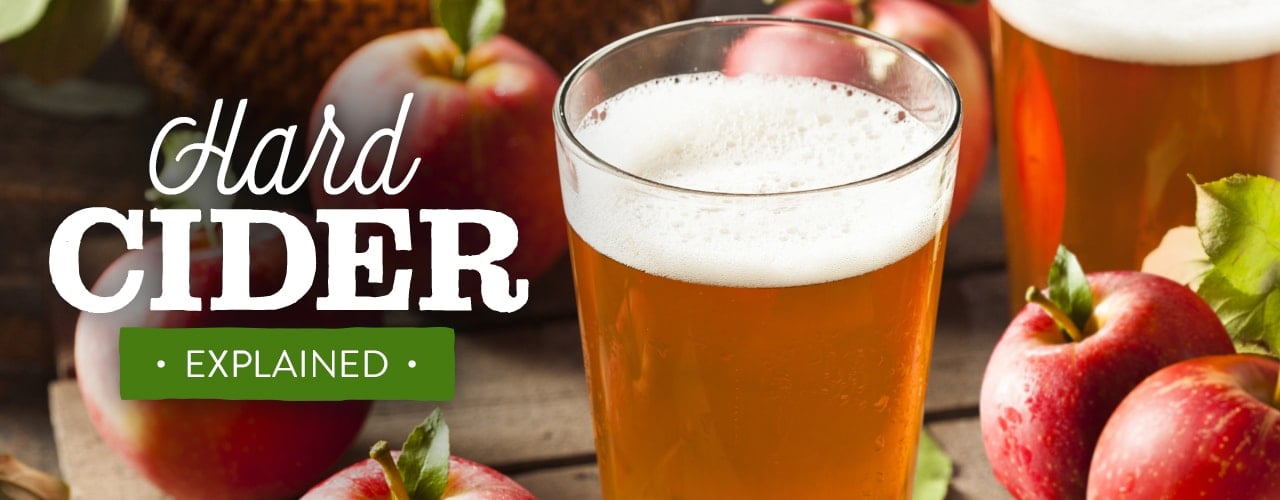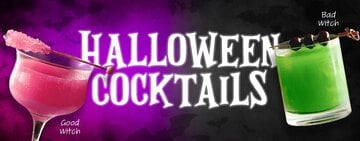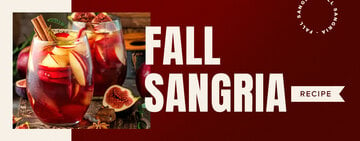Whether you're looking to build out your beverage selection or want to offer guests a gluten-free alternative to beer, hard cider is an excellent addition to your menu. Hard cider features a sweeter, brighter flavor profile than beer styles and is especially popular during the fall. We'll introduce what hard cider is, how you can make it, and the different types of cider to choose from below.
What Is Hard Cider?

Hard cider, sometimes called hard apple cider or just cider, is an alcoholic drink made from fermented apple juice. Though you can make hard cider from all kinds of apples, cider apples are recognized as the best choice. It is most popular during the late summer and fall months.
Hard cider has a rich history and cultural significance in many countries including Europe and America. It has been enjoyed for centuries and is deeply ingrained in the traditions of countries like England, France, and Spain. The production methods and flavor profiles can vary greatly depending on the region, resulting in a wide range of cider styles to explore.
Is Hard Cider Alcoholic?
Hard cider is an alcoholic drink, but its alcohol content can vary depending on the type of cider you choose, the production process, and the brand.
Hard Cider Alcohol Content
On average, most hard ciders are 4.5% - 7% alcohol by volume (ABV), while some ciders have an ABV as high as 10% or 12%. Drier ciders usually have a higher ABV because the yeast consumes a majority of the cider's natural sugars.
Types of Hard Cider

There are three main types of hard cider, each appealing to individuals with different palettes. The key distinction between them is their level of sweetness, and most can be purchased still or carbonated. We've outlined the most popular types of hard cider below:
- Dry Cider: These types of cider are typically the most acidic and contain less than 0.5% residual sugar. This less-sweet drink also contains a higher alcohol content than other ciders. Most dry ciders are aged in oak barrels to complement their mineral qualities.
- Off-Dry Cider: These ciders have a smooth texture and a rich, sweet flavor. They have slightly more body than other types of cider and typically contain 1% - 2% residual sugar.
- Semi-dry and Semi-sweet Cider: These two ciders are classified together because they share many characteristics. They feature pronounced apple flavors and have heartier bodies than their counterparts. Semi-dry ciders contain above 2% residual sugar, while semi-sweet ciders can carry as much as 4%.
How to Make Hard Cider
If you have a liquor license, making hard cider is a great way to expand your seasonal drink menu. We've included a list of instructions to walk you through the process of making hard cider below:
What Special Equipment Do I Need?
- Fermentation containers
- Rubber stopper
- Air lock
- Bottles and caps
Hard Cider Recipe
Yield: 21 servings
Hard Cider Ingredients
- 2 gallons fresh-pressed apple juice
- 1/2 packet yeast
- (Optional) Sugar
Directions
- Fill fermenting bucket or glass jug with apple juice.
- Add yeast to juice to begin fermentation process. Seal container using rubber stopper and airlock.
- Allow mixture to ferment. This can take up to two weeks depending on your desired dryness.
- Let mixture sit for up to a week, letting yeast settle.
- Rack cider into a sanitized vessel with no headspace.
- (Optional) Add gelatin or pectic enzyme to bind and break down undesired proteins.
- (Optional) Add sugar to increase sweetness.
- Disperse cider into bottles.
Best Yeast for Cider
White wine yeast and champagne yeast are the two most popular options for making hard cider. Yeast is a microorganism that plays a vital role in fermentation, converting the sugars present in the liquid into alcohol. The type of yeast you use can impact the flavor, aroma, and overall quality of your cider.
- White Wine Yeast: This type of yeast is a versatile option that can enhance the fruity flavors in your cider. It is also known for its ability to ferment at cooler temperatures.
- Champagne Yeast: This type of yeast can tolerate high alcohol levels. It is often used in sparkling wines and can give your cider a crisp and effervescent quality.
Best Hard Cider
There are many hard ciders to try, and we'll take you through some fan-favorite hard cider brands below. Want to try something completely new? Consider adding a cyser-style mead to your menu. This sweet honey wine is infused with apples for a fruity twist on the storied boozy beverage.
- Stella Artois Cidre (Baldwinsville, New York) 4.5% ABV
- Blake's Hard Cider Co. Triple Jam (Armada, MI) 6.5% ABV
- Magners Irish Pear Cider (Clonmel, IE) 4.5% ABV
- Woodchuck Amber Hard Cider (Middlebury, VT) 5% ABV
- ACE Apple Cider (Sonoma County, CA) 5% ABV
- Samuel Smith's Organic Cider (Yorkshire, ENG) 5% ABV
Best Hard Cider for Fall
If you're looking for some excellent beverages to try during fall, explore these hard ciders:
- Cigar City Cider & Mead Homemade Apple Pie (Tampa, FL) 5.5% ABV
- Wyndridge Farm Cranberry Cider (York, PA) 5.5% ABV
- Harpoon Brewery Pumpkin Cider (Boston, MA) 4.8% ABV
- Seattle Cider Pumpkin Spice Hard Cider (Seattle, WA) 6.9% ABV
- Woodchuck Fall Harvest Hard Cider (Middlebury, VT) 5% ABV
- Strongbow Cider Artisanal Blend (Herefordshire, UK) 6% ABV
Hard Cider FAQ
If you're new to hard cider, there is much to learn. We'll answer some common questions about the topic below:
Is Hard Cider Gluten Free?
Most hard ciders are gluten-free. While some yeasts can contain gluten, the yeasts used in the hard cider fermentation process are naturally gluten-free. Be sure to check the ingredients in your hard cider to ensure there are no additives that may contain gluten.
Is Hard Cider Beer?

Although it can be found on beer lists, hard cider is not considered beer. The only quality the two drinks have in common is that they are fermented beverages. Beer is a fermented alcoholic beverage that's brewed from malt and flavored with hops, while cider is an alcoholic drink made from fermented fruit juice, typically from apples. The fact that cider contains no malt or hops makes these two beverages unique.
It's important to note that hopped ciders are becoming trendy in bars and on beer lists. These ciders contain hop flavors and aromas usually found in beer but are still not brewed with malt, making them a gluten-free beer substitute. Like hard seltzer, hard ciders provide a lighter alternative to beer on a bar menu.
How to Store Hard Cider
Since hard cider is fermented, it doesn't have to be refrigerated once it is bottled or canned. However, there are a few guidelines to ensure that your hard cider stays fresh and delicious.
- The ideal storage temperature for hard cider is between 40 and 60 degrees Fahrenheit. If you have a cellar or a cool basement, these are great places to store your cider. The consistent temperature and darkness will help maintain the flavor profile.
- Hard cider cans should be stored upright or on their sides. This helps distribute the yeast evenly throughout the cider, ensuring a consistent flavor.
- Never let your hard cider freeze, as this can kill yeast and alter the flavor of your cider.
Hard cider is an increasingly popular alcoholic beverage and an excellent alternative to beer or for those following a gluten-free diet. Enjoy this drink year-round as a seasonal fall or winter alcoholic choice or as a cool refresher in the spring and summertime.



